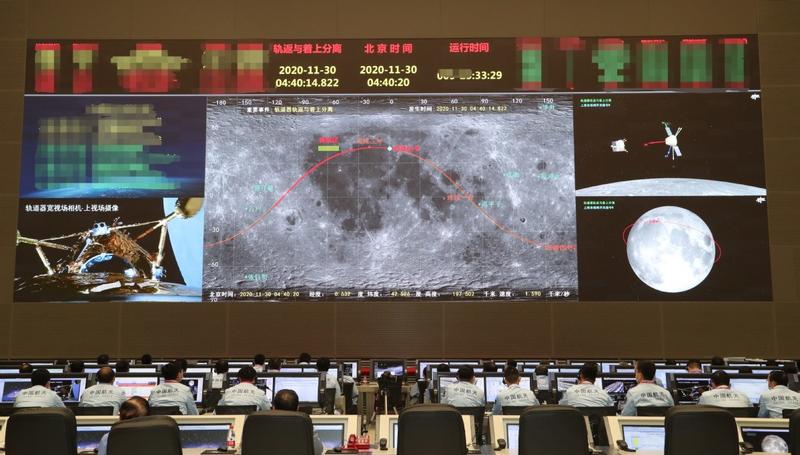 Space workers monitor the status of Chang'e 5 at a control center in Beijing on Tuesday. (PHOTO / XINHUA)
Space workers monitor the status of Chang'e 5 at a control center in Beijing on Tuesday. (PHOTO / XINHUA)
China's Chang'e 5 robotic lunar probe separated into two parts early on Monday morning in a major development of the historic sample-return mission, according to the China National Space Administration.
The 8.2-metric ton Chang'e 5, China's largest and most sophisticated lunar probe, was launched by a Long March 5 heavy-lift carrier rocket early on Nov 24
The separation took place at 4:40 am under the guidance of technicians at the Beijing Aerospace Control Center, the administration said in a statement, adding that the two parts, the orbiter-reentry capsule combination and the lander-ascender combination, were in good condition at the time.
The orbiter reentry capsule combination will continue traveling in a lunar orbit at an average altitude of around 200 kilometers above the moon, while the lander-ascender combination will prepare to conduct a soft-landing on the lunar surface, according to the statement.
The 8.2-metric ton Chang'e 5, China's largest and most sophisticated lunar probe, was launched by a Long March 5 heavy-lift carrier rocket early on Nov 24 at the Wenchang Space Launch Center in Hainan province, undertaking the world's first mission since 1976 to return lunar samples to Earth.
Before the latest maneuver, Chang'e 5 carried out two orbital corrections and two braking operations.
ALSO READ: China's Chang'e 5 probe prepares to land on moon
After touching down on the lunar surface, the lander-ascender combination will begin to engage in tasks such as using a technically advanced drill to retrieve rocks from 2 meters beneath the surface and gathering soil from the surface with a mechanical arm.
If everything proceeds smoothly, around 2 kilograms of stones and soil will be collected and packed in a vacuum-sealed metal container inside the ascender.
After two days, when the surface operations are completed, a 3,000-newton-thrust engine on the ascender will lift it to rendezvous and dock with the reentry module. It will transfer the lunar samples to the module and then separate from it.
The orbiter reentry combination capsule will then return to the Earth's orbit, where the pair will break up and the reentry capsule will conduct a series of complicated maneuvers to return to a preset landing site in the Inner Mongolia autonomous region in mid-December.
If the mission is successful, it will be the first time that China will have successfully retrieved an extraterrestrial substance. Furthermore, it will make China the third nation to bring samples back from the moon, after the United States and the former Soviet Union.


